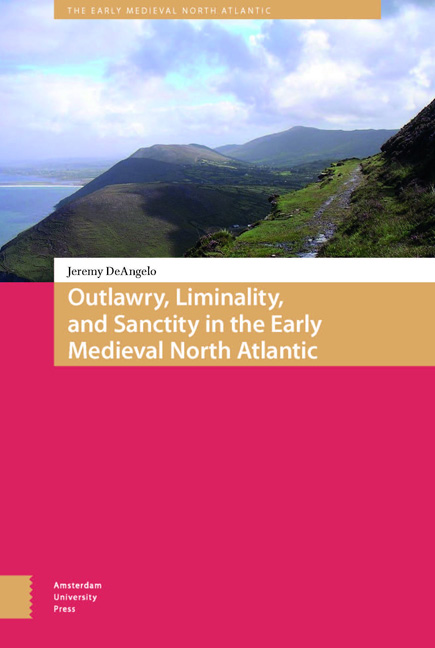Book contents
- Frontmatter
- Dedication
- Contents
- Acknowledgements
- Introduction: The Hermit and the Outlaw
- 1 Outlawry and Liminality in the North Atlantic
- 2 Imitating Exile in Early Medieval Ireland
- 3 Lessons of Conduct in Anglo-Saxon England
- 4 The Transgressive Hero
- 5 Cultural Exchange at the Boundaries of the Far North
- 6 Transgression in Transition after the Norman Conquest
- Bibliography
- Index
1 - Outlawry and Liminality in the North Atlantic
Published online by Cambridge University Press: 16 February 2021
- Frontmatter
- Dedication
- Contents
- Acknowledgements
- Introduction: The Hermit and the Outlaw
- 1 Outlawry and Liminality in the North Atlantic
- 2 Imitating Exile in Early Medieval Ireland
- 3 Lessons of Conduct in Anglo-Saxon England
- 4 The Transgressive Hero
- 5 Cultural Exchange at the Boundaries of the Far North
- 6 Transgression in Transition after the Norman Conquest
- Bibliography
- Index
Summary
The Meaning of Wrecca
The valorization of the outlaw found in medieval texts is something that likely rarely occurred in real life. In reality, the most pertinent aspect of outlaws was how desperate and dangerous they were, no matter what other qualities they may have held. Out of a simple sense of self-preservation communities did not look to them for protection, or justice, or wisdom, or any other benefit they may provide in medieval fiction. Yet the circumstances by which fictional outlaws obtain and display these positive qualities are the same that made historical outlaws unique threats to conventional society in the Middle Ages. Establishing the context which allowed for the revision of outlawry in medieval fiction hinges upon understanding how audiences in these cultures came to invest outlaws with specific abilities that other figures did not – and perhaps could not – plausibly possess.
As we shall see, what marked an outlaw was his or her unceasing motion. An outlaw was one who flees, as the Anglo-Saxon terms wrecca and flyma convey, and that flight rarely had a terminus. Instead, outlaws led a restless existence, conducted in the remote boundaries of kingdoms, scrambling to outpace those seeking to capture or kill them. Of course, outlaws were not the only individuals moving along the boundaries of medieval literature or history. Numerous types were pushed to the margins by early medieval societies, or chose to exist there, either temporarily or permanently; likewise, there are plenty of characters out of medieval literature that demonstrate similar motion. In doing so, they share much with the outlaw. Nevertheless, outlaws occupy a central place in the understanding of itinerancy in this era. They are depicted as possessing the attributes of transience more ostensibly and in greater degree than other movers, and the portrayal of other roaming heroes – from saints to warriors to sailors – in turn relies heavily on outlaw tropes. Ultimately, a consideration of outlawry and its import is inextricable from a wider conversation about the potential engendered out of the movement of bodies across boundaries in the Middle Ages. All travelers access some amount of influence on account of their position on the margins, a power unavailable to more stationary and centralized members of their communities.
- Type
- Chapter
- Information
- Publisher: Amsterdam University PressPrint publication year: 2018



